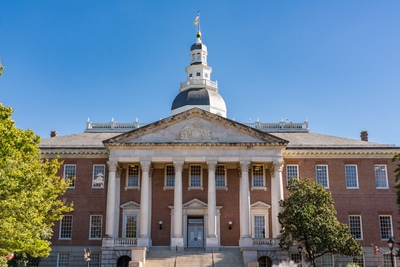
Legal
Here's What You Need To Know About Sports Betting in 2025 and Beyond
December 9, 2025 | Marvin Yates
December 1, 2023 | Sandy Dornsife

Key Takeaways:
State high courts issue thousands of opinions each year, and these court decisions have just as much of an impact on public policy as the legislative process. To help you keep track of consequential judicial decisions and their impact on state policy, MultiState publishes the Monthly Court Report, which offers a monthly recap of notable state high court decisions to provide a more dynamic picture of public policy trends.
This month, the New Mexico Supreme Court released what will surely be the first of many decisions to come out of state courts in the coming months addressing legal challenges to state congressional and legislative district maps. While the redrawing of these maps every ten years in concert with the taking of the national census is intended to ensure proper representation; in many cases, the process is used by political parties to give themselves an advantage in a majority of seats.
In Republican Party of New Mexico v. Oliver, a group of plaintiffs that included the New Mexico Republican Party, New Mexico Republican voters, and New Mexico state legislators challenged the state’s new congressional map as a partisan gerrymander designed to disproportionately favor the Democratic party. They argued that the inequitable “packing and cracking” of voters in southeastern New Mexico violated the New Mexico Constitution’s Equal Protection Clause. On November 27, the New Mexico Supreme Court ruled unanimously to uphold the decision of the trial court, finding that the district court did not err in its determination that the partisan gerrymander of the congressional map was not “egregious” and that the map was constitutional. While the US Supreme Court has previously ruled that partisan gerrymandering does not present a justifiable political question for the federal courts, it has found that such questions are justiciable under state courts. With highly anticipated opinions on redistricting expected soon from the high courts in Kentucky, Wisconsin, Utah, and New York, the political landscape may be set to change dramatically. Read more news coverage of the case here.
The Alabama Supreme Court refused to revive the state’s $1 million punitive damages cap in medical malpractice cases, finding that “the size of the award matters in relation to the particular defendant’s financial position.” In this case, where a patient was administered fatal doses of opioids, the defendant’s financial position warranted the $10 million award. Read more.
In a unanimous decision, the Supreme Court of California found that an energy company could not be sued by customers for losses resulting from power shut-offs designed to protect the public from wildfires, despite allegations that shut-offs were necessary only because the company did not properly maintain the grid. Read more.
The Colorado Supreme Court ruled that a cab company was culpable for injuries suffered by a good samaritan who attempted to defend a taxi driver being attacked by a passenger. After the initial altercation, the passenger stole the taxi cab and ran over the good samaritan. The Supreme Court affirmed the legal standard that if the theft and use of the cab as a weapon was a foreseeable escalation of the initial, foreseeable assault, then the cab company was responsible for resulting injuries. Read more.
Delaware’s Supreme Court affirmed the lower court’s decision in the product liability case of Merck & Co Inc v. Bayer AG, finding that a company does not assume liability for lawsuits over sales of products that occurred prior to their acquisition of those products from the original manufacturer. Read more.
The Florida Supreme Court ruled that personal injury damage awards imposed upon defendants may not be reduced by a payment that the plaintiff receives to settle a bad faith claim against an uninsured motorist’s insurance carrier. The court found that payouts from bad faith claims are penalties and should not be treated as insurance benefits under the “collateral source” rule. Read more.
Hawaii’s Supreme Court found that insurers do not have a right to reimbursement of defense costs unless specifically allowed by the insurance policy. Read more.
Indiana’s Supreme Court ruled that a 2021 law that retroactively prohibited class-action lawsuits against colleges and universities for actions related to the COVID-19 pandemic was constitutional. The court asserted that the law was narrow enough in scope to not unconstitutionally infringe upon the power of the judiciary. Read more.
The Minnesota Supreme Court dismissed a lawsuit attempting to bar Donald Trump from being listed on the primary ballot based on the 14th Amendment’s barring of individuals from holding public office if they “engaged in insurrection or rebellion.” The Court found that there is no prohibition against listing an ineligible candidate on the primary ballot or sending delegates to a national convention in support of such a candidate. Read more.
The Supreme Court of Missouri found that equipment purchased on behalf of a group of member companies and then resold to member companies qualified for a resale tax exemption, despite the fact that software was loaded onto the equipment before the resale. The Supreme Court found that the installation of store-specific software actually reinforced the fact that the sole purpose for purchasing the equipment was to resell it to member companies. Read more.
The Montana Supreme Court unanimously upheld the constitutionality of a 2024 citizen ballot initiative to create a top-four primary election in the state. If passed, such an initiative would create an open primary in which the top four candidates would move on to the general election, regardless of party affiliation. Read more.
The Supreme Court of Nevada ruled that the same five theories under which a nonsignatory to an arbitration agreement may be compelled to arbitrate may be used to determine whether a nonsignatory to an arbitration agreement can compel another nonsignatory to participate in arbitration pursuant to the contract. These theories include incorporation by reference; assumption; agency; veil-piercing/alter ego; and estoppel. Read more.
New Jersey’s Supreme Court found that an employee injured while driving an employer-authorized vehicle to a supply shop was “in the course of employment” under the “authorized vehicle rule,” and therefore, entitled to worker’s compensation. In this ruling, the court rejected the contention that the “premises rule” made such injuries noncompensable. Read more.
The New York Court of Appeals, the state’s highest court, upheld New York City’s ban on police use of chokeholds, despite challenges by a number of law enforcement agencies that the law was unconstitutionally vague. The court found that the law was “sufficiently definite to avoid arbitrary or discriminatory enforcement.” Read more.
The Oklahoma Supreme Court echoed its previously held position that the state constitution guarantees a woman’s right to an abortion when necessary to preserve her life when it extended the temporary injunction on three laws passed by the Legislature in 2021. The ban will remain in place until the merits of the case are considered. Read more.
The Pennsylvania Supreme Court found that the City of Philadelphia did not unconstitutionally discriminate against interstate commerce when applying tax rates to a resident who worked exclusively out of state. In this case, Philadelphia subjected the resident to its wage tax and only allowed her credit against that tax for local income tax paid to another jurisdiction and not for out-of-state income tax paid. Read more.
In Westfield Insurance Co. v. Sistersville Tank Works Inc. et al., a corporation sought insurance coverage from an insurer for state tort claims regarding negligent manufacturing of products that contributed to illnesses, even though the illnesses manifested after the policy period. The West Virginia Supreme Court found that when an occurrence-based policy is ambiguous, the policy is automatically in effect from initial exposure until injury manifestation. Read more.

December 9, 2025 | Marvin Yates

October 17, 2025 | Sandy Dornsife

September 11, 2025 | Sandy Dornsife